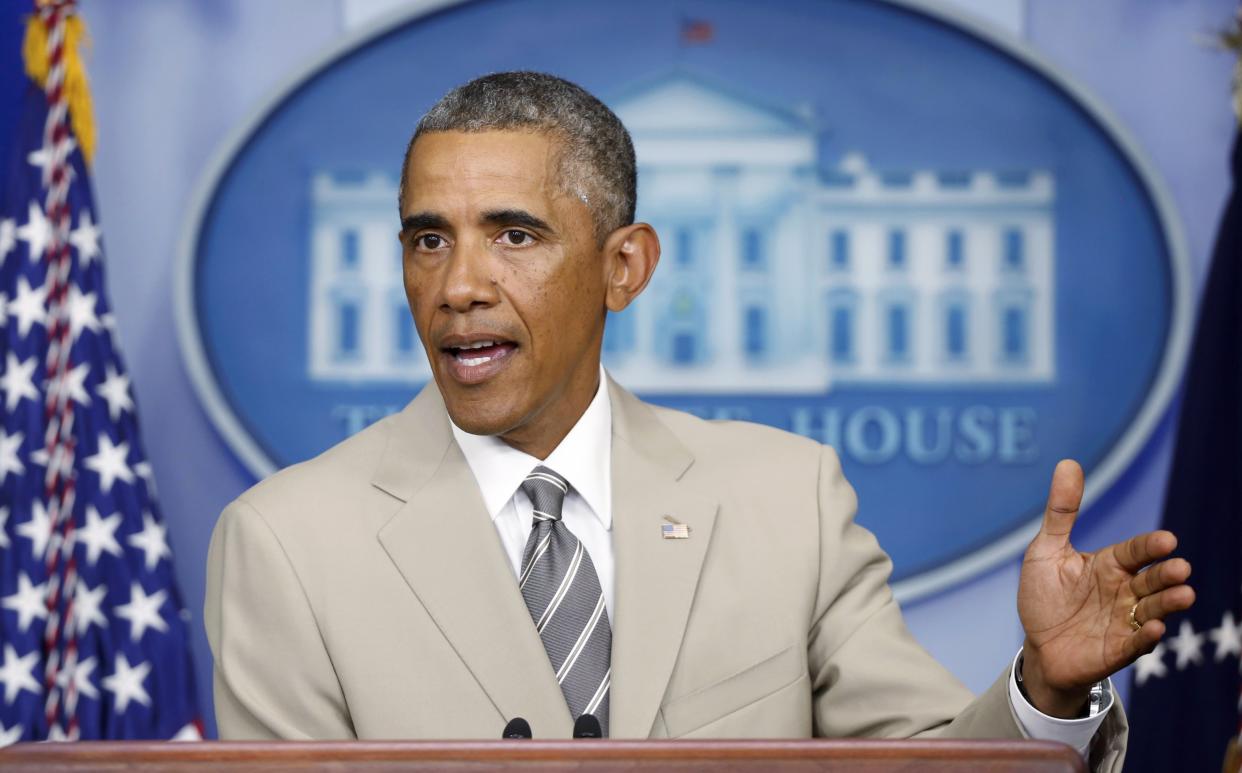 David vs. David
David vs. DavidISIS: America's piecemeal approach won't suffice in eliminating vicious Islamic uprising

It appears as if Washington has made a decision to confront the “Islamic State” by force of arms. Although so far we have struggled to find an appropriate label for it: the Islamic State of Iraq and the Levant (ISIL) or the Islamic State of Iraq (ISIS), the label is irrelevant. What we have, regardless of the nomenclature, is a terror apparatus that makes Bin Laden’s al-Qaeda operations look like malicious Boy Scouts.
Indeed, we are still attempting to get an intelligent (and intelligence) appreciation of the Islamic State’s objectives, leadership, ideology, and prospects. What we have currently is akin to a meteorological assessment of a desert sandstorm. It has burst out of the “rebel” chaos in Syria, and even long-term experts in Iraq knew nothing about any aspects of it even while it was seizing most of northern Iraq and destroying the Iraqi army in the process. Collapsing like the proverbial house of cards, the Iraqi army’s debacle was reminiscent of South Vietnam’s inability to fend off North Vietnamese attacks without U.S. assistance.
What we do know is the Islamic State has embarked on a relentlessly vicious campaign to carve out territory in Iraq and Syria that it is governing under murderous theocratic rule. Its objectives appear open-ended; as a self-designated “caliphate,” it claims authority over all Muslims. It will cease only when its unstoppable force meets an immovable obstacle. Thus far it has slaughtered the inhabitants and ethnically cleansed the lands it occupies. It has emphasized its potential for modern terror by decapitating a U.S. journalist, sending video images throughout the Internet. And it hints heavily of more atrocities to come. Westerners are horrified, but local residents may be paralyzed. One recalls the maxim that population shifts to support those exercising the most effective terror.
[ David Kilgour: Arab states must work together to accommodate all groups in the region ]
Thus through mischievous, blithe neglect, the United States now faces a variety of unpleasant choices.
For example, our 35-year hate fest with Tehran (and our high-precedent effort to prevent an Iranian nuke) may be muted while Iran fights ISIS. Likewise, we may defer our conviction that Bashar al-Assad “must go” from Syria. And maybe the long-rejected Kurdish independent state isn’t anathema?
For six years, U.S. President Obama has worked successfully to be the foreign policy “anti-Bush.” Previous administration’s policies confronted the “NIH syndrome” (not invented here). And thus bad ideas and good ideas went out with the same bathwater. Now, facing ISIS, there is a “back to the future” element to Washington’s headless-chicken-scurry-about-in-all-directions-at-the-same-time fulminations.
If there is one clear judgment from this exercise, it is that nobody but nobody appears to know what they are doing.
Will Obama go to Congress to request authorization to put more boots on the ground, or does that sound overly akin to asking for congressional action to destroy Syrian chemical weapons?
Have we decided that the enemy of our enemy is our friend, and embrace Tehran’s mullahs as long as they fight ISIS? Recall we decided that the same USSR that invaded Finland and divided Poland with the Nazis in 1939 was headed by loveable “Uncle Joe” Stalin after Hitler invaded Russia.
If there is one clear judgment from this exercise, it is that nobody but nobody appears to know what they are doing.
Will we recognize the reality that Assad’s military has won its civil war and stop trying to overthrow him as long as he fights ISIS combatants in Syria?
Have we rediscovered the “War on Terror” when Secretary of Defense Chuck Hagel proclaims ISIS is an “imminent threat to every interest we have,” or would that be an overly “Dubya” approach?
Do we intend to assemble a grand coalition of lions/lambs/pitchforks/hammer-handles such as Iraq, Syria, Turkey, Iran, Saudi Arabia, Lebanon, Gulf States, UK, France to overthrow ISIS? Will we seek a UN mandate? Or is this process too reminiscent of 1991’s Baker-Bush coalition that evicted Saddam from Kuwait? Or even the coalition of the willing that invaded Iraq in 2003 in search of non-existent weapons of mass destruction?
Perhaps just bomb ISIS back to the Middle Ages? But could we accept the resultant civilian casualties?
Maybe there is order underlying the apparent confusion. Perhaps there is some rabbit still concealed in the tall, silk hat to be outed in a presidential speech to the nation?
Or perhaps it will be a combination of mix-and-match half measures with more deployed U.S. forces, more bombing to destroy ISIS-seized U.S. equipment, an effort to stabilize the quicksand of Baghdad politics, and standard congressional deadlock.
One hopes there will be something resembling policy before Afghanistan disintegrates.
(Photo courtesy of Reuters)
David T. Jones is a retired State Department Senior Foreign Service Career Officer who has published several hundred books, articles, columns, and reviews on U.S. - Canadian bilateral issues and general foreign policy. During a career that spanned over 30 years, he concentrated on politico-military issues, serving as advisor for two Army Chiefs of Staff. He has just published Alternative North Americas: What Canada and the United States Can Learn from Each Other.



